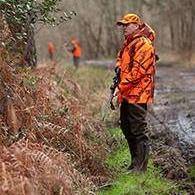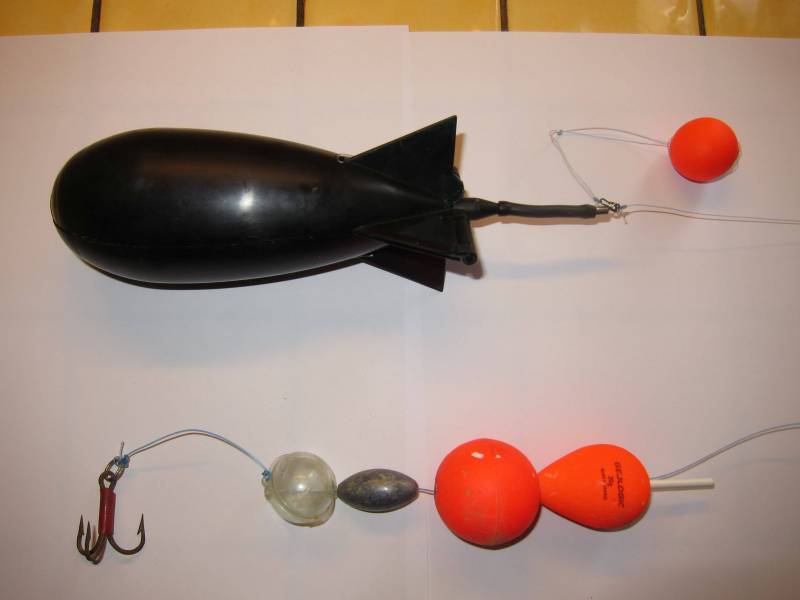-
Posts
333 -
Joined
-
Last visited
-
Days Won
31
Content Type
Profiles
Forums
Gallery
Blogs
Events
Articles
Everything posted by carpepecheur
-
Turns out you were nearer the mark than you think Crusian. The lake is in thick woods on the side of a long valley. In the bottom of the valley is a narrow strip of pasture land. The other side of that is a track and open unfenced woodland. The French hunters spread out in a line along the track while their dogs flush out game from the woods behind onto the open pasture land where they can be shot. I am not talking shotguns for pheasants etc. They are using proper rifles for wild boar and deer. I can't call out and let them know I am directly behind their target because I am not supposed to be there.
-

new byte alarms over engineered hype
carpepecheur replied to oscsha's topic in Carp Fishing Tackle and Equipment
Exactly. He uses nearly 100 words to say that low frequencies penetrate better than high frequencies. -
Hi and welcome EW. I thought you might get more response to your query. I use conventional and telescopic rods. The latter have improved in quality over the years but seem more popular on the continent. My only complaint is that they can twist in use so the eyes are not aligned but if they are used intelligently this is a trivial problem. There is a third option and that is the traveller style rod. Here is a link to an example. It all packs down to just under 1 metre . traveller style rod
-
-
I think I must beg to differ Oscha. Technology does not affect angling ability. For example a Deeper cannot tell you whether a lump on a flat lake bed is a carp or a kitchen sink. Only your experience can tell you it is not likely to be a kitchen sink.
-
Absolutely, there is no substitute for time spent on the water
-
When I started fishing, I used a homemade brass centre pin reel. Now I use a fixed spool which is a masterpiece of precision engineering constructed completely automatically using the latest robotic technology. My first rod was handmade from a tank aerial and wooden handle turned on a lathe. Now I use a high tensile, featherweight, carbon fibre rod developed using the latest aircraft construction technology. When I went night fishing I sat up all night in a deck chair with my finger on the line to feel for a bite. Now I lay on my comfortable folding bed chair wrapped in a four seasons sleeping bag in a waterproof and insect proof bivvy waiting for the receiver on my high tech bite alarm developed from research into the space program to tell me which pre programmed, colour coded, tone was indicating a bite on which rod. To measure depth, I used to use a plummet (lead with cork insert). Now I use an echo sounder, first patented in 1913 and now with the paper graph replaced by a screen and the results recorded on a microchip and everything miniaturised. All of the above progress made my fishing easier and more comfortable. NONE of them put a fish on the hook. As they say "nostalgia is not what it used to be"
-
The innocently smiling emoji was meant to suggest I was only gently teasing Highy, after reading another thread. I still love using my Mk IV although it is way past its sell by date so understand exactly what you mean. The old ways are often the most enjoyable. £150 ? Some people pay that for a single high tech bite alarm.
-
-
The marketeer who coined the phrase "fish finder" must be laughing all the way to the bank. A Deeper cannot differentiate a fish from a kitchen sink. OK there aren't too many kitchen sinks in a lake but there are plenty of gas bubbles, loose bits of weed or general detritus floating around all of which give a reflection to the pulse generated by the transducer. If you could be sure it was a fish, it would only tell you where it had been and not where it would be when you are fishing. You would not be able to tell if it was a carp or a bream. Carp are sensitive to vibration so you may have already scared them off. Switch on your Deeper by dipping it in water and listen to the noise it makes. A Deeper is a good tool for measuring depths very quickly and can replace hours of thrashing around with a marker float. More important for me is it can locate underwater obstructions such as an area of submerged fallen trees which could be a hazard to landing a fish or which could provide a holding area. It is nothing more than a useful tool that requires experience to get the most benefit from it.
-

Some further thoughts on the use of salt
carpepecheur replied to carpepecheur's topic in UK Bait and Bait Making
Yes, I agree Yonny. It was only an indication and best I could do at the time. What was interesting was that with just a tiny prick of a hole in the bag, it collapsed almost immediately. Did you notice the wave of salt solution wash around the bottom of the tank? The undissolved (presumably due to contact with salt) remains of the bag floated to the top. The only scientific method I can think of is to use salinity metres in a real lake and actually measure this in a real situation. Unfortunately, now that I have retired, I no longer have access to such equipment. My experience is that when you are able to make precise measurements the results do not always agree with theory. Despite everyone telling me it was impossible, I once proved that Brighton goes up and down with the tide. -
I have had crack offs with both Spombs and a Deeper but have never lost one yet. I tie a small hi vis float to the Spomb or Deeper with a length of light line. In the event of a crack off, the small float drifts behind the lost Spomb or Deeper and makes it easy to see at a distance. I then cast a retriever over it. This is just a heavy floating object which trails a large treble hook. This picks up the line between float and spomb and retrieves it easily. I have a photo of one I made earlier. The Deeper is an incredible piece of kit. As professional surveyor (retired) I do not consider myself a noddy for simply using the tools of my trade. I do not rely on it. It simply expands my experience.
-

Some further thoughts on the use of salt
carpepecheur replied to carpepecheur's topic in UK Bait and Bait Making
I repeated the earlier experiment with some water disturbance as Yonny suggested. This time I pricked a tiny hole in the bag to help it dissolve quicker. I first tried to simulate a carp thrashing around then I introduced some undertow. I have a clock at the side so you can see where I have speeded the footage up. There is a very faint colouring in the upper layers but most of it stays near the bottom althought not as concentrated as the earlier test. -

Some further thoughts on the use of salt
carpepecheur replied to carpepecheur's topic in UK Bait and Bait Making
You seem to confirm what I have been discovering which is that not enough is known about the exchange of salt. I suspect the actual amount a carp needs is incredibly small compared to the amount anglers might throw at the problem (even assuming it is a problem) Apparently Mark Holmes, who people often quote as an authority, suggests that carp need more salt in spring. Am I correct in thinking that salt is lost in two ways – by excretion and by osmosis (the denser body fluids moving towards the less dense water)? If this is the case, maximum secretion and hence salt loss takes place in summer when carp are consuming more and the water is warmer therefore less dense. When you talk about ppt, I have been trying to visualise what that number looks like. If my (dodgy) calculations are correct 1 ppt is like putting an average egg (30 ml) into 2,400 full size (50M X 25M) Olympic swimming pools 1 metre deep. -

Some further thoughts on the use of salt
carpepecheur replied to carpepecheur's topic in UK Bait and Bait Making
Sorry oscha, i missed this post earlier. I did not mean to ignore or avoid your question. I simply meant any lake containing carp. I was wondering if there was a very low level of natural salinity present but the answer to that question is "no". -

Some further thoughts on the use of salt
carpepecheur replied to carpepecheur's topic in UK Bait and Bait Making
Thanks again for the info and education Greekski. Out of curiosity do you know how many milligrams of salt (or should that be sodium ions?) a carp of say 10 lb weight needs to replace in a year? Is there any particular time a carp needs more salt and if so why? Most posts I have seen defend the use of salt by quoting how much the carp can tolerate as evidenced by experts like koi keepers. Do you know which aquatic life is most affected by salt and what level in ppt that might be? Sorry to be a pain but I find the subject very interesting. -

Some further thoughts on the use of salt
carpepecheur replied to carpepecheur's topic in UK Bait and Bait Making
Huge respect to you for your chosen career Greekski. So are you saying there is zero ppt salt in an average carp lake or are you referring to pure water? If there is no salt in the water where do the carp get their salt from for their natural osmoregulation? Your point that anglers are hypocritical professing care for the fish then hooking it out of its environment on a metal hook is very well made. Because of my over thinking nature, I have struggled with this dilemma a lot. I still go fishing. A lot of anglers care a great deal about their environment but far too many do not. -

Some further thoughts on the use of salt
carpepecheur replied to carpepecheur's topic in UK Bait and Bait Making
"Why pick on the poor old salt granule" Because, unlike bait or weed removal, the evidence I have seen suggests salt has an accumulative effect. Bait disintegrates, weed grows back but salt just goes on building up. People thought a few bits of plastic would have no effect on the vast oceans - well we are better educated now ---- aren't we? However I proudly accept your criticism that I over think things. Yes I do. -

Some further thoughts on the use of salt
carpepecheur replied to carpepecheur's topic in UK Bait and Bait Making
I am learning a lot from this discussion. Greekski, you said carp can osmote (I think I just invented a new verb) better in a salinity of 2PPT. Do you know what the typical salinity of a carp lake normally is? I have no idea myself as I am not a biologist but I am curious. The point I was (badly) trying to make is that the danger is not to the carp directly but to the aquatic flora and fauna on and in the lake bed. I repeat I am not a biologist but I suspect some at least some of it has a lower tolerance to salt. Surely we are [censored]ing up the aquatic ecosystem by adding salt even by just a small amount just to give an edge to our fishing. My comment about not understanding the water table was to say I do not understand how salt can be purged from a lake by diffusion or filtration through the water table, especially as the consensus seems to be that the salt is distributed throughout the water column and not as I hypothesise forming a layer on the lake bed. I am fairly convinced by the evidence I have seen that salt accumulates. The idea seems to be that the amount of salt polluting our lakes by anglers is so small we should not worry about it. Well when we started dumping plastics in the oceans it was thought they were so vast in expanse and depth it that surely it couldn’t do any harm. Now generations later we are somewhat wiser (although still not doing enough about it). -

Some further thoughts on the use of salt
carpepecheur replied to carpepecheur's topic in UK Bait and Bait Making
Yes totally agree. I have just the spot in mind. It is an enclosed and gated lake with hardly any fishing activity. It holds a huge head of carp at around the 10 lb mark. There is a shallow area dropping off into deep water. I have already tested the use of raw maize there and the carp hoovered it all up. Watch this space. -

Some further thoughts on the use of salt
carpepecheur replied to carpepecheur's topic in UK Bait and Bait Making
Mark Holmes apparently watched carp dig a hole around some sticks of rock salt and came to the conclusion that carp were attracted to salt. It is a reasonable conclusion to come to. However my interpretation of that observation is that the salt kills all the small organisms within a small area and the carp move in to eat them. I believe Mark Holmes suggestion is they do not eat the salt but rub against it to absorb salt into their bodies to replace that lost over winter. If that is the case why dig a hole? If, on the other hand, the salt had penetrated a small distance into the silt, the carp would dig to find even more dead organisms to eat ths supporting my suggestion. I can't find any scientific evidence that carp actively seek out high salt concentrations of salt for their osmoregulatory process. The process takes place naturally from salts already in the system. If, has been suggested, that they are attracted to an area baited with salt, how much do they need and how often? I would guess that one block of salt would serve the entire fish population for many months. It seems self evident that the actual amount of salt they actually need is incredibly small compared to the amounts being spodded in by anglers. Yonny, I see you have a theory that salt does not sit on the bottom and kill everything. Other than wishful thinking how do you know? Sure there is disturbance by water currents and fish activity but my simple experiment suggests a fair amount of salt at toxic levels will rest on the bottom causing damage to aquatic life. I have access to an unvisited lake and next spring I am going to make some PVA salt water bombs and see what happens in a real environment. Meanwhile I think the best approach is - if in doubt leave it out. -

Some further thoughts on the use of salt
carpepecheur replied to carpepecheur's topic in UK Bait and Bait Making
That's a good point. When I cleaned the tank the lead weight I used was covered with a gloopy mess. I wonder what would happen to a bag of sweetcorn? Lots of stuff to investigate and so little time. -

Some further thoughts on the use of salt
carpepecheur replied to carpepecheur's topic in UK Bait and Bait Making
No I didn't. The reason was I was surprised by how slow the PVA took to melt and did not want to disturb it. We know that adding salt to a mix allows you to put a wet mix in a pva bag without it melting but I expected it to dissolve from the outside very quickly. What seems to happen is a skin forms inside which doesn't fully dissolve. The sequence after the bag was in the tank took about 15 minutes. I speeded it up because it was boring to watch. I will try as you suggest and see if it disperses quicker through the water or if it settles back down again. I am also interested to see how it disperses in the water over time. -

Some further thoughts on the use of salt
carpepecheur replied to carpepecheur's topic in UK Bait and Bait Making
Thanks for comments. Just what I was looking for. In reply :- “you were very surprised but the result of this experiment but I think the result was exactly what you and I expected” I was expecting some separation between the denser salt and the water but I was astonished that the salt remained so concentrated in such a very thin layer on the bottom of the tank. “To replicate those volumes in a water body of any significance would take many thousands of tonnes of salt at a guess.” I used about 10 ml of rock salt and it covered about 0.1 square metres. That equates to 100 ml per sqr metre. A 5 acre lake is roughly 4000 square metres so it would need 400 litres of salt to entirely cover it under the same conditions. That is not a huge amount. Roughly 1000 kilo. Ok this is under laboratory conditions and there are many variables in real life. I suspect the salt solution would roll down hill and fill up hollows and low spots. I have no idea how long it would take to diffuse through the water column. I feel another experiment coming on. “If we imagined that the salt did stay in a concentrated area when introduced to a large body of water it could certainly go some way to explaining why "salting a spot" can be so effective, particularly on rich, weedy waters. It'd clear the spot nicely ready for perfect presentation.” Yes, that is precisely my point. You create a mini desert in that area. I believe that, when salt is initially introduced, it kills off the microorganisms and the carp move in for a free lunch. However it leaves behind an inert bed. Is that what we really want to do? “I think the statement that still waters have no natural mechanism by which salt can be removed is misleading. Salt is water soluble and the water in lakes is constantly recycled through natural water cycles (rain vs. dispersal through groundwater). In the concentrations used for carp fishing this has a negligible effect (imo) on a water body.” This is a relevant point and I have no understanding of how salt may disperse through groundwater. I would suggest that even if it does, it has already done its damage to the lake bed. “ anglers rarely use a saturated solutions (did I see undissolved salt in the glass before it was added to the pva bag?) “ Yes I just put in a tablespoon of salt into a glass. But surely if people are putting a salt lick into a swim the initial solution in direct contact with the salt is saturated so the demo is not that representative “for me, it's a moot point however, as I for one don't use salt in my carping,” I think that is the attitude everyone should adopt. “It's more a case of them needing it than liking it. It's a mineral that is very difficult for them to obtain in a freshwater environment and carp need it to function.” I am not sure I agree. Is there any evidence for this? Carp seem to have evolved for thousands of years without the need of extra salt added artificially. I have never come across a case of carp suffering from a lack of salt. But I could be completely wrong. “I agree with you that anglers should be aware of possible dangers but imo that "oh well" decision couldn't possibly result in the hundreds of tonnes of salt it would take to even match the salinity levels preferred of their tanks by koi keepers.” I have been trying to demonstrate that it is NOT the levels of salt that the Koi experts find acceptable that is the danger. It is the much smaller amounts that endanger microorganism growth. -
This is France where the main occupation is making rules and the major passion is swerving round them. I totally support the rules relating to transport or return of live crayfish. I am guessing the other rules restricting their catching were designed years ago when it was legal to catch the native species and was an attempt at preventing overfishing them. Despite fishing little used and remote locations I did once get caught by a garde de peche (bailiff) in possession of 150 crayfish. He simply gave me a warning, explained the rules and then showed me the correct way to kill a crayfish. These days I always take my dog with me when I am fishing and he gives me plenty of warning if someone is coming so that I can ensure I am not breaking any rules.









